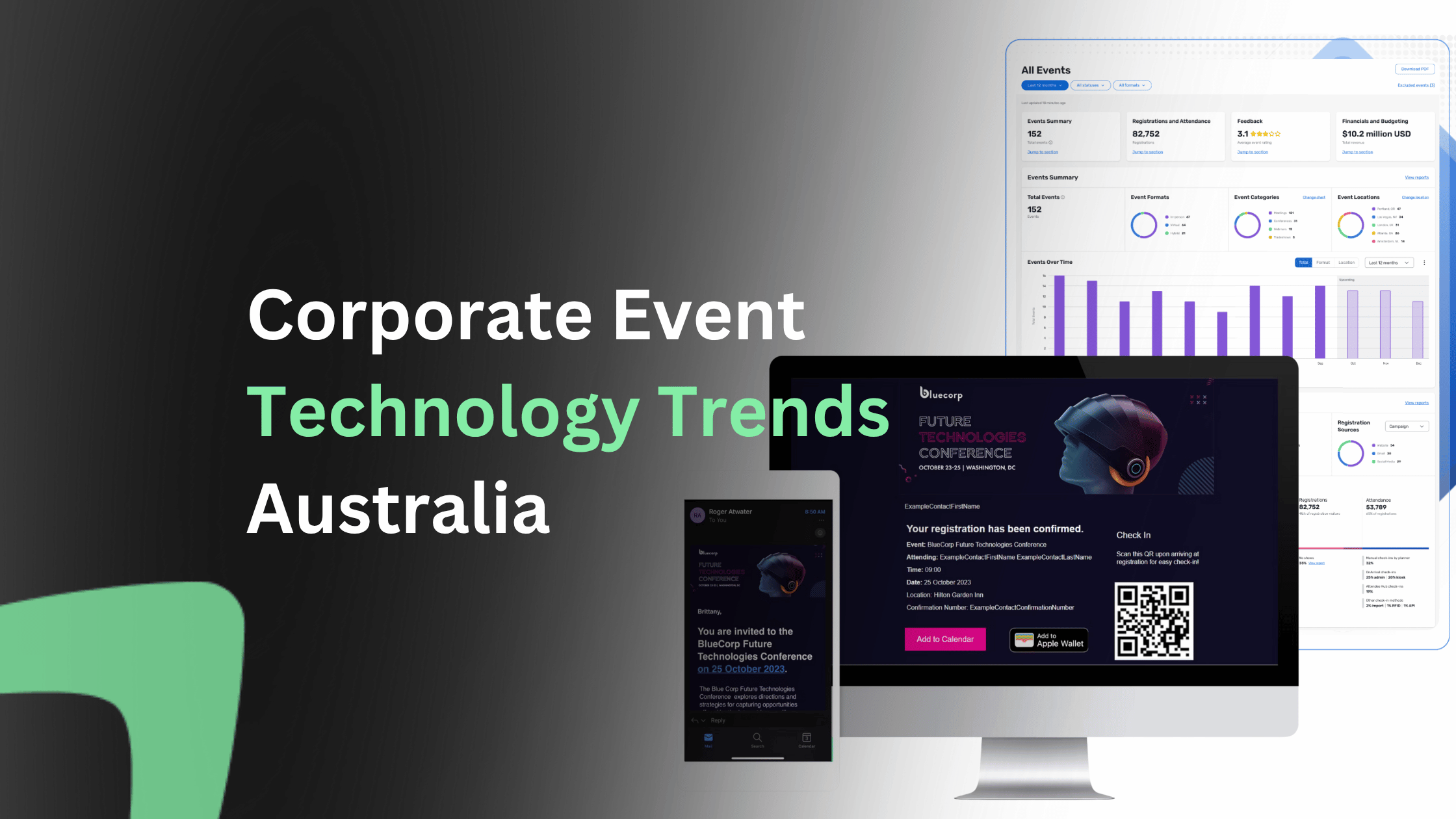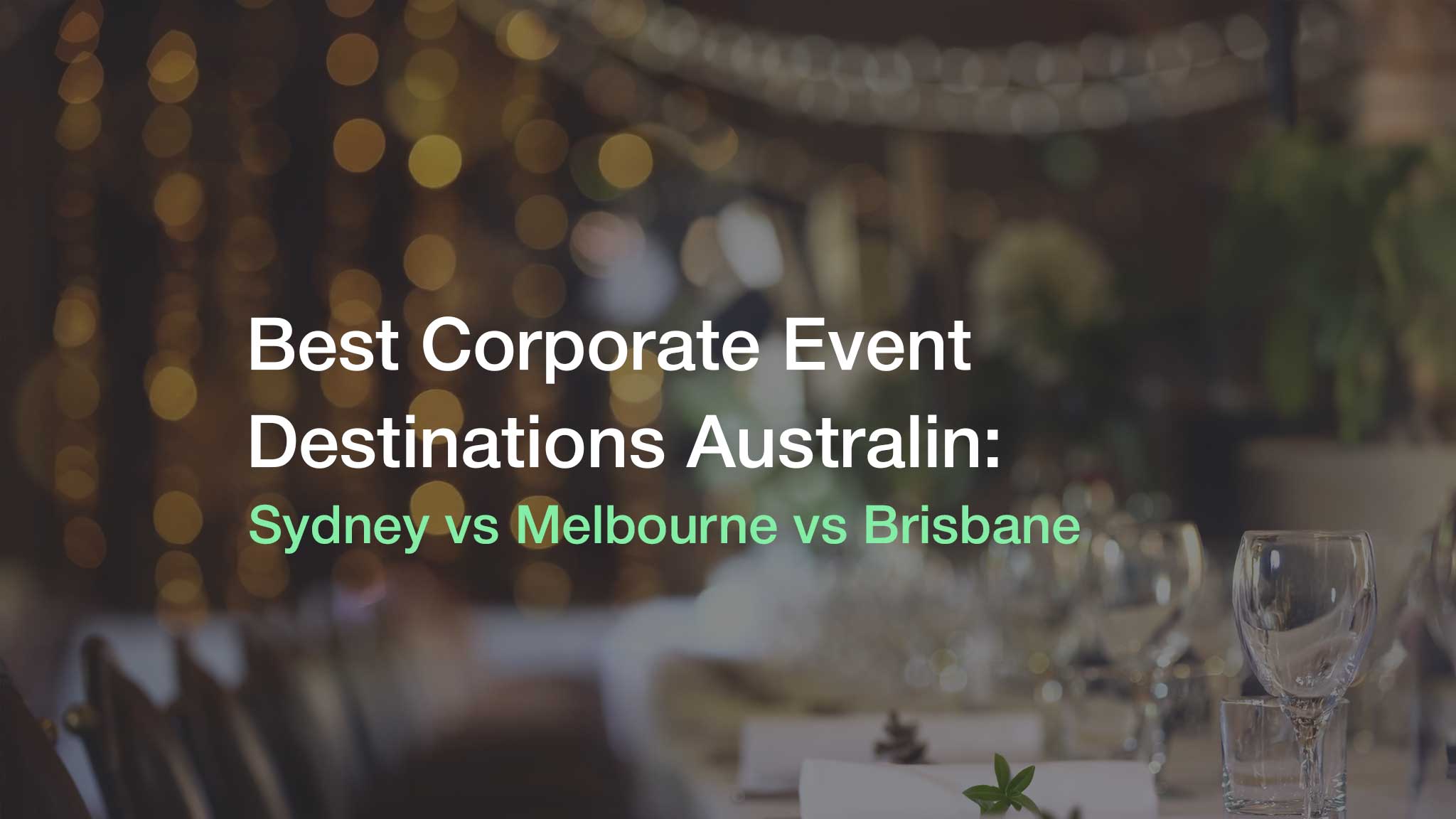
The corporate event technology landscape in Australia has evolved at remarkable speed. Since 2020, hybrid formats have become the norm, with nearly 68% of Australian corporate events now blending in-person and virtual elements. Technology investment has surged by over 150% since 2022, as organisations realise it’s no longer a stopgap but a strategic advantage that drives engagement, efficiency, and measurable ROI.
At On Purpose Events, we’ve been proud to help leading organisations harness this transformation – integrating technology seamlessly with a sustainable event management approach, and always with the human experience at the centre.
In this guide, we explore the key technologies shaping Australian corporate events in 2025, from AI planning tools to hybrid event platforms, along with practical insights, cost breakdowns, and recommendations for building smarter, more connected experiences.
Hybrid Event Technology Essentials
Hybrid events have moved well beyond simple live streams. Today, they’re dynamic engagement platforms that connect in-person and virtual audiences through purposeful design, smart technology, and seamless coordination.
Core Streaming Platforms
Zoom Events offers breakout rooms, registration management, and analytics ($3,500-$8,000 per event). Hopin provides comprehensive event management with integrated networking and expo areas ($12,000-$15,000). Microsoft Teams remains cost-effective for organisations already invested in the Microsoft ecosystem.
Interactive tools like Slido and Mentimeter transform passive viewers into active participants through live polling and Q&A ($1,200-$4,500 annually). Virtual networking solutions now feature AI-powered matchmaking, connecting attendees based on interests and objectives.
Cost Comparison Analysis
Understanding format costs enables strategic decisions:
- Fully In-Person: $180-$350 per attendee
- Hybrid Events: $145-$280 per attendee
- Fully Virtual: $45-$95 per attendee
Hybrid events require upfront technology investment but deliver 3-5 times the attendance reach, significantly improving cost-per-engagement metrics.
Australian Venues with Hybrid Capabilities
Sydney’s ICC Sydney offers built-in broadcast capabilities and high-speed infrastructure. Doltone House locations provide hybrid-ready spaces with intimate spaces. Melbourne’s MCEC Studio delivers purpose-built hybrid spaces with in-house production teams, whilst Lunar combines aesthetics with technical sophistication.
Brisbane’s BCEC provides comprehensive hybrid infrastructure, and Howard Smith Wharves offers riverside settings with full technical capabilities.
Technical Requirements Checklist
Before committing to hybrid events, verify:
- Minimum 100 Mbps upload speed (200+ for multi-stream)
- Redundant internet connections
- Professional audio with lapel and audience microphones
- Broadcast-quality cameras (minimum 1080p)
- Dedicated streaming technician and platform moderator
- Content backup systems and contingency plans
AI and Automation in Event Planning
Artificial intelligence is reshaping event planning — streamlining time-intensive tasks and unlocking new levels of personalisation that elevate the attendee experience from start to finish.
AI-Powered Applications
Modern platforms utilise machine learning for networking matchmaking, analysing attendee profiles to create meaningful connections with 45% higher satisfaction rates. AI chatbots handle routine queries 24/7, reducing support staff requirements by 60% whilst improving response times.
Predictive analytics forecast attendance with 85-90% accuracy, enabling precise catering and space allocation. For multi-track events, AI creates personalised agendas based on interests and objectives, increasing session attendance by 30%.
Organisations implementing comprehensive AI report approximately 30% reduction in administrative time. At On Purpose Events, we’ve integrated AI tools across planning workflows, allowing our team to focus on strategic creativity whilst automation handles routine coordination.
Event Registration and Check-In Technology
First impressions matter, and registration technology often sets the tone for the entire event experience. Today’s smart systems do far more than manage sign-ins; they remove friction, capture and report on valuable data, and create a seamless, branded welcome for every attendee.
At On Purpose Events, we leverage Cvent’s event management platform to streamline registration, automate communication, and deliver real-time visibility across attendee journeys. From pre-event registration to onsite check-in, Cvent enables integrated workflows that reduce queues, personalise engagement, and support sustainability through digital-first processes.
Mobile Event Apps and Check-In Systems
Organisations increasingly weigh the benefits of custom-built apps (typically $15,000–$45,000) against white-label solutions ($3,000–$8,000). For most corporate events, proven platforms such as Cvent, Eventsair, and Whova provide rapid deployment, intuitive design, and robust functionality without the high development cost.
Smart check-in tools like QR code scanning can reduce entry times by up to 70%, while RFID badges enable tap-to-connect networking, automated session tracking, and insightful analytics on attendee flow, helping planners optimise engagement in real time.
Integration and Compliance
The true power of event technology lies in its ability to connect seamlessly with the wider business ecosystem. Leading platforms like Cvent offer robust API integrations with CRM systems such as Salesforce and HubSpot, ensuring attendee data flows automatically and accurately between systems. This not only streamlines reporting but also strengthens personalisation and post-event engagement.
For Australian organisations, data compliance remains essential. All event technology must align with the Privacy Act 1988, including clear consent mechanisms, transparent data use, and secure storage of personal information.
Real-time dashboards now give event teams a live view of registration trends, ticket sales, revenue performance, and audience demographics, enabling faster, data-informed decisions before, during, and after each event.
Interactive Event Experiences
Today’s audiences expect more than to simply attend, they want to participate. Interactive technologies turn passive attendees into active contributors, driving deeper engagement, richer feedback, and stronger connections between people and content.
Gamification and Engagement Tools
Gamification taps into natural curiosity and friendly competition to make learning and networking more rewarding. Points-based systems can recognise booth visits, session participation, and peer-to-peer engagement. Events that adopt these techniques often see up to 45% higher attendee engagement and 60% more exhibitor interactions (typically $2,000–$6,000 per event).
Live polling and audience response tools bring real-time interaction to sessions, enabling instant word clouds, ratings, and quizzes that keep audiences active and informed.
Emerging technologies like virtual and augmented reality are finding practical roles in venue walkthroughs and product demonstrations.
Finally, social media walls continue to be a simple yet powerful engagement driver curating live hashtag feeds that encourage sharing and extend an event’s reach well beyond the venue. Built-in moderation and analytics tools help ensure brand safety while tracking audience sentiment and engagement.
Event Technology Budget Planning
Strategic investment in event technology begins with a clear understanding of both the direct costs and the often-overlooked hidden expenses, from integration and licensing to training and support. Making informed choices ensures technology enhances the experience without compromising budget or sustainability goals.
Platform and Equipment Costs
Event technology platforms charge:
- Entry-level: $2,000-$5,000 per event
- Mid-tier: $5,000-$10,000 per event
- Enterprise: $10,000-$15,000+ per event
For frequent hybrid events, purchasing equipment ($15,000-$25,000) becomes cost-effective after 5-8 events compared to rentals ($3,000-$5,000 per event).
Technical Support and Hidden Costs
Budget for dedicated roles:
- Stream producer: $800-$1,500 per day
- Camera operators: $600-$900 per day
- Audio technician: $700-$1,100 per day
- Platform moderator: $500-$800 per day
Hidden costs include enhanced internet bandwidth ($500-$2,000), testing time, contingency equipment, and post-event editing ($1,500-$4,000).
ROI Framework
Measuring the return on event technology means looking beyond upfront spend to assess the broader impact on audience reach, engagement, efficiency, and data insights. The most effective frameworks evaluate value across five dimensions: reach multiplication, engagement improvement, time savings, data value, and competitive advantage.
For example, a hybrid event may cost around $20,000 more than an in-person-only format, yet deliver up to three times the audience reach – effectively reducing the cost per attendee by 40% while generating richer analytics and long-term brand visibility.
When viewed through this lens, technology becomes less of a line item and more of a strategic investment that compounds value across every stage of the event lifecycle.
Choosing the Right Technology Stack
Selecting the right event technology is about choosing solutions that align with your objectives, audience, and brand values. A systematic, purpose-driven approach ensures technology enhances the experience rather than complicating it.
Assessment Framework
Start by defining the fundamentals: audience size, event goals, budget, internal capability, and sustainability priorities. From there, identify platforms that integrate seamlessly with your existing CRM and marketing tools through robust APIs, ensuring data flows effortlessly across systems.
Always evaluate technology from the attendee perspective. Complex registration processes or clunky interfaces can deter participation. Accessibility should be non-negotiable: ensure platforms meet WCAG 2.1 AA standards, supporting screen readers, keyboard navigation, and closed captioning for inclusive participation.
Vendor Vetting
Thorough due diligence protects both brand and audience. Assess potential partners on client references, security credentials, financial stability, Australian data hosting options, and sustainability practices.
At On Purpose Events, we go further, evaluating each partner’s environmental commitments to ensure every technology choice supports our clients’ broader ESG and sustainability objectives.
Professional Technology Management
Technology complexity means minor oversights can derail events. Professional coordination delivers peace of mind and superior outcomes.
Expert Coordination and Partnerships
With technology now central to every event, even minor oversights can disrupt the experience. That’s why professional event coordination is essential, delivering peace of mind, consistent quality, and measurable outcomes.
At On Purpose Events, our experienced event managers oversee every stage of the technology lifecycle, from platform selection and vendor coordination to technical setup and contingency planning. Our long-standing relationships with leading technology partners enable 15–25% cost efficiencies while ensuring responsive, on-the-ground support throughout delivery.
Comprehensive technical rehearsals conducted test every possible scenario, from connection drops to bandwidth challenges, ensuring platforms perform flawlessly when it matters most. Our contingency planning includes backup internet connections, redundant streaming solutions, and spare equipment for complete reliability.
Post-Event Insights
Our work doesn’t end when the event does. Post-event analysis transforms data into actionable insight – evaluating engagement patterns, session popularity, networking metrics, and platform performance to inform continuous improvement and ROI measurement.
At every stage, our approach blends technical excellence with a sustainability mindset, ensuring each technology decision supports both event success and environmental responsibility. For organisations delivering multi-day conferences or national conference programs, this integration becomes even more critical to achieving consistency, value, and purpose at scale.
Conclusion
Corporate event technology in 2025 presents extraordinary opportunities to design experiences that are more engaging, accessible, and measurable than ever before. The 156% rise in technology investment reflects a clear shift – organisations now view events not as one-off moments, but as ongoing engagement platforms that build connection, generate valuable insights, and extend brand reach.
When guided by clear objectives, realistic budgets, and expert coordination, technology becomes far more than a logistical tool, it becomes a catalyst for sustainable business growth and meaningful human interaction. Whether integrating hybrid capabilities, automating workflows with AI, or enhancing engagement through interactive tools, success comes from thoughtful planning and purpose-driven execution.
Ready to elevate your next event?
Contact On Purpose Events for a tailored consultation that aligns with your goals, budget, and values, ensuring every digital choice delivers real-world impact.




